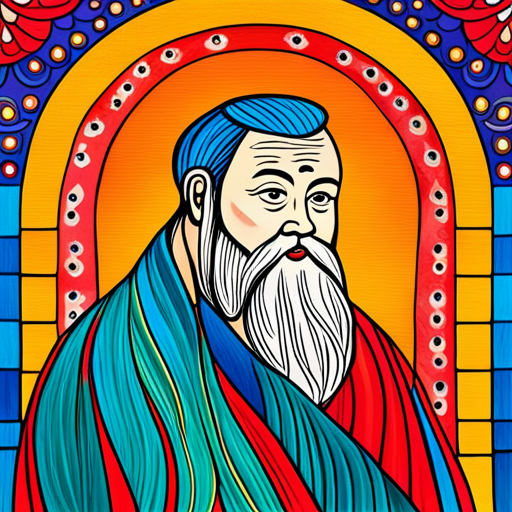Autobiography of Confucius
Birth and Early Years
Born as Kong Qiu in the State of Lu (now known as Shandong Province) around 551 BC, my journey began under the shadows of my family’s fallen aristocratic status. My father, an old soldier, passed away when I was just three years old, leaving my mother to take on the immense task of raising me in an era that was marked by moral chaos and socio-political instability.
It was in these formative years that my curiosity for the world around me began to grow. Even as a child, I was keenly interested in the rituals and customs of my ancestors. I often found myself immersed in the historic texts and teachings of the ancient sages. Little did I know, these books were to become the foundation for the philosophy I would later propound.
Becoming a Teacher
As a young man, I became a teacher. With limited resources, I aimed to make education accessible to all, breaking free from the prevalent norm of education being a privilege for the elite. My classes were open to students of all socio-economic backgrounds, which was a novel concept at that time. I held the conviction that a virtuous man who receives the proper education can become a ‘junzi’ or ‘gentleman’, a model individual who represents the best of humanity.
I taught various subjects, including history, music, archery, charioteering, calligraphy, and rites. However, what I emphasized most were the core principles of virtue, propriety, and benevolence. I believed in the cultivation of personal character and moral excellence.
The Struggles and Travels
Yet, as I aged, I felt increasingly frustrated at the inability of the ruling classes to heed my advice for good governance, moral conduct, and respect for rites. Disappointed, I made a critical decision in 497 BC. I left my hometown, along with a small group of loyal disciples, on a long journey across the different states of China. This was a mission to find a ruler who would appreciate and employ my teachings to create a harmonious and prosperous society.
We roamed from state to state for more than a decade, but our search was in vain. Nevertheless, this period of hardship and adversity brought forth a silver lining. It offered me the opportunity to refine my teachings and expand my ideas, many of which have been documented by my disciples in the Analects.
The Return Home and Legacy
After years of wandering, I returned to Lu at the age of 68. Though I failed to implement my teachings during my lifetime, my return brought renewed interest in my philosophy. I spent the rest of my days writing, teaching, and developing what would later be known as Confucianism.
My demise came in 479 BC, yet it was not an end, rather a beginning. My teachings lived on through my disciples and eventually formed the backbone of Chinese society’s moral and ethical code. The Five Classics, texts that I reinterpreted and compiled, became the cornerstone of Chinese education for centuries.
My philosophy, often referred to as Confucianism, emphasizes harmony, social order, and the importance of familial relationships. It encourages the cultivation of virtues such as ‘Ren’ (benevolence), ‘Li’ (proper behavior or propriety), ‘Xiao’ (filial piety), and ‘Yi’ (righteousness), providing a guide for moral living and good governance.
Reflections
Looking back, I see that my life was marked by a relentless pursuit of wisdom, moral perfection, and an ideal socio-political order. I stood as an advocate for education and equal opportunities. My teachings, borne out of
a period of disorder and chaos, aimed at promoting harmony and ethical conduct, values that remain relevant even today.
Though I might not have achieved my goals during my lifetime, the seeds of my thoughts, my philosophy, eventually blossomed, influencing not just China, but also other East Asian societies like Korea, Japan, and Vietnam. Even today, centuries after my passing, I find solace in knowing that my teachings continue to guide individuals and societies toward moral excellence, respect for tradition, and harmony among mankind.
Show more +
